
-04 August-2024-
Eighteenth Sunday in Ordinary Time
Gospel reading: John 6:24-35
vs.24 When the people saw that neither Jesus nor his disciples were there, they got into boats and crossed to Capernaum to look for Jesus.
vs.25 When they found him on the other side, they said to him,
“Rabbi, when did you come here?”
vs.26 Jesus answered:
“I tell you most solemnly, you are not looking for me because you have seen the signs but because you had all the bread you wanted to eat.
vs.27 Do not work for food that cannot last, but work for food that endures to eternal life, the kind of food the Son of Man is offering you, for on him the Father, God himself, has set his seal.”
vs.28 Then they said to him,
“What must we do if we are to do the works that God wants?”
vs.29 Jesus gave them this answer,
“This is working for God: you must believe in the one he has sent.”
v s.30 So they said, “What sign will you give to show us that we should believe in you? What work will you do?
s.30 So they said, “What sign will you give to show us that we should believe in you? What work will you do?
vs.31 Our fathers had manna to eat in the desert; as scripture says: “He gave them bread from heaven to eat.”
vs.32 Jesus answered:
“I tell you most solemnly, it was not Moses who gave you bread from heaven, it is my Father who gives you the bread from heaven, the true bread;
vs.33 for the bread of God is that which comes down from heaven and gives life to the world.”
vs.34 “Sir,” they said “give us that bread always.”
vs.35 Jesus answered:
“I am the bread of life. He who comes to me will never be hungry;
he who believes in me will never thirst”.
*******************************************
We have four commentators available from whom you may wish to choose .
Michel DeVerteuil : Holy Ghost priest, director of the Centre of Biblical renewal, Trinidad W.I.
Thomas O’Loughlin: Prof of Hist. Theology University of Nottingham NG7 2RD
Sean Goan: Studied scripture in Rome, Jerusalem and Chicago
Donal Neary SJ: Editor of The Sacred Heart Messenger and National Director of The Apostlship of Prayer.
****************************************
Michel DeVerteuil
Lectio Divina with the Sunday Gospels
www.columba.ie
Textual Comments
With this gospel we begin the series of teachings of Jesus which draw lessons from the miraculous feeding, all under the general theme of Jesus: The Bread of Life.
The language in these passages comes across as vague and abstract, and we must make a special effort to let the passages speak to our experience as all gospel passages are meant to do. We can refer back to the story of the miraculous feeding and see the teaching fulfilled there in practice; but it is also important to understand the biblical language as being true to our life experience. For example, the expression “seeing the signs“ (verse 26) is the process by which we go beyond some event and discover that it tells us about life, a person, the movements of sin and grace, and so on.
It is the same process that Pope John XXIII called “interpreting the signs of the times,“ when he urged us to understand the significance of modern social and political movements for the gospel message. So too God “sets his seal“ on a person (verse 27) means that he is acting within that person, using the person as his instrument.
The expression “eternal life“, which occurs in verse 27 and several times in later passages, tends to remain especially abstract. People often take it to mean merely “the next life,” and it does include that, but it means more. The best approach is not to try and understand it all at once, but to enter gradually into what it means.
Think, for example, of deeply spiritual people, the kind of people that neither sickness nor failure nor death itself can stop from living creatively: they are living “eternal life.“
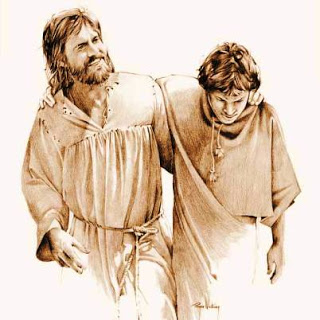 Or you might remember a time when you felt so close to God that you felt you could face anything – that too is an experience of “eternal life.“ By referring back to experiences like these you will be touched by the teaching of Jesus.
Or you might remember a time when you felt so close to God that you felt you could face anything – that too is an experience of “eternal life.“ By referring back to experiences like these you will be touched by the teaching of Jesus.
Today’s teaching takes the form of spiritual journeys that Jesus leads the people to take. We can identify three:
– verses 24 to 27: Jesus leads them to move from looking to him for material food to looking for something more spiritual; you can interpret that at many different levels – our relationship with God, for example, or with one another, or with some movement that we have joined;
– verses 28 to 33: Jesus invites the people to give up all forms of human security and put their trust in God alone: in these verses they are looking for the security that comes from knowing that they are doing “the right thing”;
in verses 30 and 31 It is the security of pointing to favours received or of having great leaders like Moses;
– verses 34 and 35: the people express good desires, but they are looking for the miraculous bread in some vague place; Jesus brings them back to reality: This bread is present in his own person: (I am the bread of life)
Prayer Reflection
Lord, true friendship is a journey into a deeper kind of living,
like the journey Jesus invited the people to make with him.
When we first love someone, we are all excited about him/her;
we want to be with our newly found friend all the time.
“When did you come here?” we are always asking.
We are still at the stage of satisfying some need of ours, working for food that cannot last.
Gradually we realise that there is something sacred about this relationship,
that you have set your seal on it and it is offering us an opportunity to live at a deeper level than we have done.
We still have a way 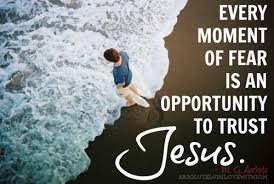 to go: we want to do many things to please our friend,
to go: we want to do many things to please our friend,
when it isn’t a matter of doing anything, but rather of trusting in him in times of challenge .
So, too, we must stop looking for signs that we are loved, the kind of signs that others have got,
and just keep on being grateful for this person whom you have sent to us.
Truly, such a relationship calms our restlessness and gives life.
Lord, when people come to us asking what they must do
if they are to do the work you want, it is tempting to give them easy answers,
“Do this and do that, and you will be doing what God wants.”
But you want us to be honest, like Jesus, saying clearly that there is no such security for us, that the “work” we have to do is to give ourselves to the ‘present moment’,
as your gift coming down from heaven, and this is the only thing that will set us free from the hungers and thirsts which keep us in bondage. This is the meaning of incarnation.
Lord, forgive us that we become complacent when people flock around us.
Give us the wisdom of Jesus to see that
*children come to our schools, but it is to be successful in their examinations;
* people vote for us at elections because we have got them favours;
* we are often praised by some who are afraid to hurt us.
Help us to be like Jesus and to offer those whom you have given to our care the kind of food that endures to eternal life; for it is for this that you have set your seal on us.
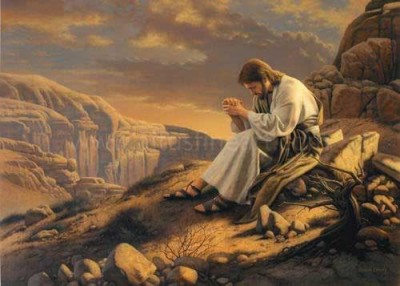 Lord, we often feel deeply hurt when we realize that people are coming to us
Lord, we often feel deeply hurt when we realize that people are coming to us
because we have given them something; they haven’t got the message that we need to be loved for our own sake.
We thank you that Jesus can understand, because he had the same experience.
Lord, we thank you for moments of deep prayer when we know that we have eaten bread from heaven and feel a great calm, as if we will never be hungry or thirsty again.
Lord, thank you for great leaders who are like Jesus – they do not give in.
*************************************
Thomas O’Loughlin
Liturgical Resources for the Year of Matthew
www.columba.ie
Introduction to the Celebration
We have gathered to offer thanks to the Father for his care and love in our lives. 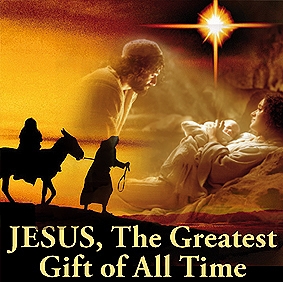
And we make this thanksgiving in union with Jesus who is the wisdom of God and our brother.
But today our reflection on the Father’s goodness holds, as it were, a mirror up to this relationship that the Father has established with us in Jesus, and we are reminded that the Father’s greatest act of love was sending Jesus to us.
Our fathers in the desert long ago thanked the Father for the gift of heaven-sent bread, but we thank the Father that heavenly life and wisdom have come down to encounter us in Jesus. In Jesus we see our God made visible and so are caught up in the love of the God we cannot see.
Homily Notes
1. One can write the story of humanity as the story of our searches for our needs: for food, water, security, pleasure, comfort, for power; but also for happiness, for understanding, for love, for friendship, for wisdom, and for a reality beyond all these: the reality to which we give the label ‘God‘.
2. These searches are also the basis of our joys, our hopes, our disappointments, our frustrations, and our fears.
3. To be a disciple of Jesus is to believe that many of these desires, these searches, find their fulfilment in him and his teaching because he is the supreme gift of the Father to humanity. He is the Wisdom of God made fully accessible to us.
4. As food satisfies our human hunger, as water satisfied our human thirst, so Jesus satisfies our desire for wisdom and of access to life in its fullness. To assert that he is ‘the true bread‘ is to assert that in him the needs that are greater than the immediate and the physical find fulfilment: he gives us true life, he gives us true joy, he gives us happiness that exceeds human happiness.
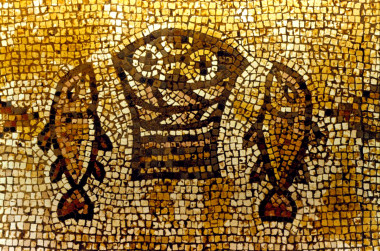
5. He who believes in Jesus will never thirst. So how do we express our faith in him? We express this faith in him as the Father’s gift when we gather as his community,
*the community founded upon him,
*the community inspired by his Wisdom,
*the community that shares his bread and his cup.
(image right: Church in Tabgha, Israel, early church mosaic of loaves and fishes signifying Jesus, our food )
**********************************
Sean Goan
Let the reader understand
www.columba.ie
Gospel
We return here again to the fallout from Jesus’ miracle of the loaves and fishes. The crowd is depicted as searching enthusiastically for Jesus but when they find him he confronts them on their motivation, saying they must look beyond their full stomachs to see what God is saying to them through what has taken place. What God is asking of them is that they believe in the one he has sent.
In the fourth gospel faith is not a concept, it is an activity.  Believing in Jesus is the equivalent of doing the work that God wants because it involves a personal relationship, an abiding in him. However, the crowd don’t understand and look for a sign such as their ancestors received. The irony is that they have just such a sign in front of them but they fail to see it.
Believing in Jesus is the equivalent of doing the work that God wants because it involves a personal relationship, an abiding in him. However, the crowd don’t understand and look for a sign such as their ancestors received. The irony is that they have just such a sign in front of them but they fail to see it.
Jesus tells them he is the true bread, not like the manna, but the bread of God’s word that satisfies the deepest human hunger. They are invited to nourish themselves on the bread of life, in other words to come to know and believe in Jesus. At this point in the narrative the evangelist is not yet speaking about the Eucharist — that will come later. Here he is making use of the Old Testament symbolism of wisdom as nourishment to speak of Jesus as the only one who can satisfy our hunger for God.
Reflection
We only have to consider the number of cookery programmes on television to realise that food is big business and that it has little to do with feeding the hungry. In the developed world it is about novelty, the exotic, what is really healthy. We don’t want the same old thing over and over because we get bored easily. In a certain sense, this type of potent symbol for what is being addressed in the readings. To quote from Deuteronomy, ‘Human beings do not live on bread alone but on every word that comes from the mouth of God’. We hunger for meaning, a sense of purpose and if that is addressed then we can be truly content. This is what Jesus, as the bread of life, is speaking about. In him we can come to understand ourselves and be amazed at our own dignity and worth in the sight of God. We are, at heart, spiritual beings and if we don’t address that, then we might easily spend our time satisfying our appetites and never our deepest need.
*********************************************
The ‘I’ Word
Jesus is a man of the ‘I’ word – and not in a boastful way. He speaks of the bread in the desert, the manna which nourished the people in their wanderings. He builds on their belief in a bread from heaven, but now that he himself is the bread. The bread gives life to the soul. He is this bread.
Our Christian faith is centred on a ‘person‘, not on a book. The gospel is the book of life because it is the book of Jesus. Jesus is our life because he comes from God. So we call this at times the bread of heaven.
What more ordinary ways can heaven and earth be linked than in the most ordinary of foods? In another country he might have said he is the ‘rice’ of life. It means that in the ordinary events of our lives, God is very near in Jesus. He makes his home in us as the bread we eat becomes part of us.
 The same with love – our faith links always human and divine love, and human love of all sorts is a share in the divine life of love. Can we really believe this? That the next time you really love your child, your friend, your spouse or anyone in your love-life, you are bringing them a bit of God!
The same with love – our faith links always human and divine love, and human love of all sorts is a share in the divine life of love. Can we really believe this? That the next time you really love your child, your friend, your spouse or anyone in your love-life, you are bringing them a bit of God!
That is one of the main reasons why we want to live in love. That we link heaven and earth, divinity and humanity, Jesus and ourselves.
Then the ‘I’ of Jesus becomes the ‘we’ of his earthly body and presence now.
Breathing in and out –
let the word ‘love’ echo in your mind and heart
on the inbreath and the outbreath.
Lord, thy kingdom come!
**********************************************************